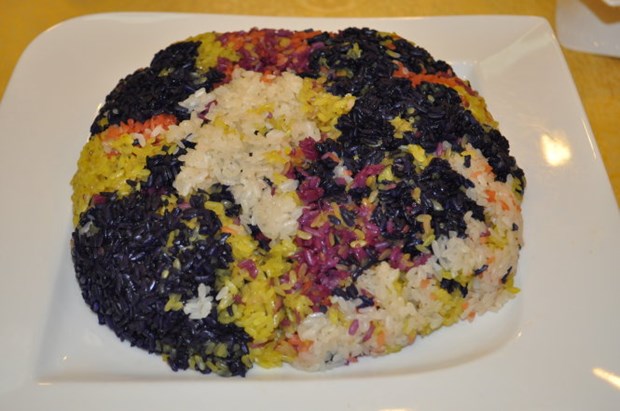Among them, the “Khâu nhục” dish served with five color sticky rice and prepared by
the team from Thai Hai tourism area of Dinh Hoa in Thai Nguyen province got special
attention from diners.
To explain the name of the dish Chef Anh
Lan Vu explained that it has to go through many stages of cooking. This
requires a lot of skill such as deep frying, roasting fire, cooling in water
then steaming for a few hours, until the pork becomes really soft and almost
melts.
Because of this process with many
challenging test therefore it is called “khổ
nhục” which means suffering all the hard times but ethnic minority Tay and
Thai people in the Northwest usually call it with local accent so it become “khâu nhục”.
There is another explanation, simply that “khâu” means steamed until it is almost
melted and “nhục” means meat.
The bacon should be cleaned pricked all
over with a needle then seasoned with cardamom juice, dried bamboo shoots,
mushrooms, kaempferia galangal, cogon grass and a little ginger.
Chef Lan Anh explained that seasoning pork
with cardamom juice and cogon
grass will make the pork have a fresh, sweet taste and a natural aroma
without using MSG or other artificial flavorings.
After seasoning, the pork is fried until
the skin is crunchy. It is then soaked into a cold water so that the skin and
the meat soften. The skin is then deeply scored and seasoning is rubbed into
the scores.
The “Khâu
nhục” is best if it is steamed in a wooden steamer for 4 to 6 hours
following the tradition of the Northwest people. The spices will be absorbed
deeply into the fibers of the pork.
Nowadays there is also another way to make
this dish. After boiling, the pork can be cooled in beer instead of cold water
which softens the meat quicker.
According to tradition, the Tay people make
“Khâu nhục” for special occasions
such as wedding, traditional holidays and festivals. It is served with five
color sticky rice. The “Khâu nhục”
melts into the sticky rice making a truly delicious meal.
“If this dish is served with banana flower
salad then this will be three typical dishes that you can find anywhere in the
Northwest area” said Chef Anh Lan Vu.
|
 Five colors sticky rice - Photo: Tuan Viet Vu Five colors sticky rice is made using rice
grown in Dinh Hoa, Thai Nguyen Province. It has a very good aroma and is very
soft. The five colors are created using natural coloring. It is sometimes
called “Five element sticky rice”
Sticky rice symbolizes the harmony of earth
and sky, bringing good luck and health: green (the symbol of trees) comes from
the purple magenta stamen mixed with the ash of burned rice straw, yellow (the
symbol of land) from turmeric, purple (symbolizing water) from purple magenta
flowers, red (the symbol of fire) from red magenta plants and a little wine,
and white (symbolizing metal) is the original color of the sticky rice itself.
The unusual thing is that all of these five
colors are steamed in the same steamer but each keeps its own color..
|